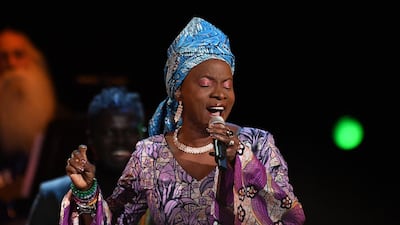As music evolves to reflect the current times, so does the Grammy Awards.
Over its six-decade history, the industry’s biggest night has introduced and pulled the plug on certain categories.
New entries include Best Contemporary Instrumental Album and Best American Roots Performance from 2015, while time was called on the Best Polka Album in 2009, the Best Jazz Fusion Performance in 2001 and Best Disco Recording – the latter awarded only once in 1980 for Gloria Gaynor's I Will Survive.
The latest amendment comes into play during Sunday's ceremony.
Making its competitive debut is the Best Global Music category, which honours artists performing non-Western musical genres.
If it sounds familiar, you would be right, as it’s essentially a rebranding of the Best World Music Album, which was discontinued in 2020.
While it might seem like a simple name change, the Grammy Awards says the new moniker strips the category of any racial undertones.
"The change symbolises a departure from the connotations of colonialism, folk and 'non-American' that the former term embodied, while adapting to current listening trends and cultural evolution among the diverse communities it may represent," read a statement.
The new iteration also represents a fresh start for the category's competing artists, some of whom had previously expressed concern over the genre's inference.
A matter of understanding
Angelique Kidjo was a dissenter.
The Beninese singer holds a record three Best World Music Album awards, including its last for Celia in 2020.
Even with the career boosts afforded by the awards, Kidjo felt conflicted by the association.
Those doubts were first planted by her mentor, the late South African singer Miriam Makeba, in the early '90s.
Long before her own nomination for 2001's Homeland, Makeba expressed reservations about the term "world music", which was coined in a meeting of English record label executives in a London pub in 1987.
"It was Makeba who really broke it down for me," Kidjo tells The National.
“I am telling you, she was mad. She was saying ‘what kind of disrespect is this?’ and how by these people calling it the World Music Award, what they are essentially saying is ‘the third world’.
“That conversation lit an absolute fire within me and I never looked at it the same since.”
That said, with Kidjo's career flourishing as part of the World Music wave emerging from the mid-1980s, which included the popular Womad international series of festivals, she understands the functional purpose of the category.
“As soon as something becomes popular, people need to categorise it,” she says.
“But at the same time, I feel we are all complex enough as humans to really understand the music without someone doing the work for us by labelling it.”
Time for some action
It is a viewpoint Kidjo has expressed to the Grammy organisers over the years, and the lobbying efforts by her and fellow artists paid off when the awards decided to scrap the name for a more inclusive banner.
Kidjo initially expressed reservations when joining the consultation process last year. “I remember saying if it’s just brainstorming and no action then I am not for it,” she says.
“But we started this conversation and we spoke to artists from Nigeria, Kenya and different parts of the world, so that everyone can feel comfortable with it.
“We decided to call it Global Music, because we are artists who travel the world and play our music everywhere. Why should we be viewed, in the subconscious of people, as less human than anyone else?”
While the new name is arguably a more accurate representation of the sound, the award has yet to capture the scope of the expansive scene.
Since its inception in 1992, the Best World Music Album was joined by the Best Traditional World Music Album and Best Contemporary World Music Album awards from 2004.
However, as part of an overhaul in 2011, the latter two awards were nixed and merged with the former.
Not far enough
US producer Dawn Elder, whose parents share Palestinian and Lebanese descent, says she welcomes the name change, but that it doesn't reflect the diversity of its sounds.
"You can't approach World Music, or now as its called Global Music, as just one thing," she tells The National.
“We are talking about a number of genres and styles, including folk and jazz. So how do you capture all of that and thousands of artists and albums, both in and outside the US with just one award?
“And, by the way, why is it only an award for an album and not the single format? If you put it all together, it simply doesn’t go far enough.”

One way forward, Elder proposes, could be for Global Music to follow the lead of the Latin Music industry.
Deemed too sprawling to fit in the main Grammy Awards ceremony, the Recording Academy, which administers the award, decided to launch the Latin Grammy Awards in 2000, with its own star-studded ceremony and categories.
Elder, who has worked with the Arab world’s biggest stars as both an album and concert producer, says a Global Music Grammy Awards event would not only provide a more accurate representation of the thriving industry, but shed an even bigger international light on various music scenes in the Middle East and North Africa.
“An artist from the Middle East has never won a major Grammy and this is despite having great singers like Fairuz, the late Wadih Al Safi, Sabah, Kadim Al Sahir and the list goes on,” she says.
“They all need to be acknowledged, but there is no way to represent them in the Grammys.
“This is despite a multi-generational Arab-American community here that is seven million people, many of whom also go to concerts and contribute to the industry.”
Between two worlds
Despite the challenges, Elder is optimistic about the Grammys substantive efforts in representing Global Music.
“I know some people who are members of the Recording Academy who genuinely want to listen and make a difference,” she says.
“Many of the changes that happened in the Grammys came as a result of lobbying by the music community, from independent artists, labels and producers to all aspects of the community. I think we can make some of the necessary changes over time.”
Until then, the newly branded Global Music scene is caught in the middle. As one of its greats, it is something Kidjo has learned to live with.
"Our music is everywhere, but I feel like we are still in limbo," she says.
"Global Music remains stuck in two worlds and people still don't know where to put us."
The Grammy Awards take place on Sunday, March 14 at 5pm PST (or Monday, March 15 at 5am in the UAE).
The full list of Grammy Award performers and nominees is available here.


